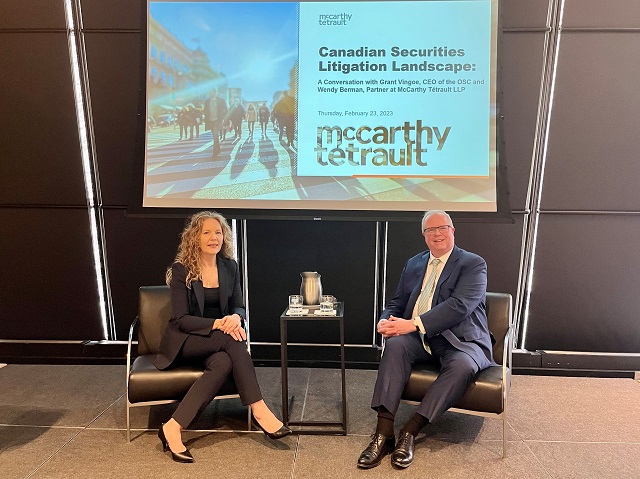On February 23, 2023, Grant Vingoe, CEO of the Ontario Securities Commission (OSC) joined Wendy Berman of McCarthy Tétrault for a discussion regarding key issues impacting Canadian capital markets, including relating to environmental, social and governance (ESG) disclosures, greenwashing litigation, and recent developments for crypto asset trading platforms (CTPs), as well as observations looking ahead in 2023.

Takeaway 1: Wait and See – Canadian Climate-Related Disclosure Regime
Canadian securities regulators have pressed pause on the proposed enhanced climate-related disclosure rule for issuers (NI-51-107). An enhanced climate-related disclosure regime remains a "matter of urgency" for the OSC given its central materiality to the affairs and prospects of issuers. Mr. Vingoe expects Canadian regulators to continue to monitor recent international developments closely before implementing enhanced climate-related disclosure requirements in Canada. The urgent need for mandatory climate-related disclosures must be balanced with the importance of global consistency and Canadian market "right sizing" to ensure efficient capital allocation. Mr. Vingoe noted that Canadian securities "need to find a place in global portfolios and cannot be sidelined by a purely made in Canada solution" for climate disclosures. The imminent finalization of standards for sustainability-related financial disclosures by the International Sustainability Board (ISSB) and anticipated revised rules for climate-related disclosures in the United States are two developments that are anticipated to impact the Canadian disclosure regime. Mandatory enhanced climate-related disclosures for Canadian issuers are coming but the timing and content remain uncertain.
Takeaway 2: Greenwashing – An Unsustainable Practice
Canadian securities regulators remain focused on greenwashing risk. Increased demand for sustainable investments and enhanced sustainability-related disclosures has heightened the potential for greenwashing. Recent disclosure reviews by Canadian securities regulators identified concerns about greenwashing in core regulatory and voluntary filings, including unsubstantiated net zero commitments and overly promotional sustainability-related disclosures. Mr. Vingoe anticipates that in the near term the OSC will continue to engage cooperatively with responsible public companies and investment funds through issue-oriented disclosure reviews to disrupt the potential for greenwashing. However, he cautioned that egregious greenwashing conduct may well attract OSC enforcement action and that over time the OSC's tolerance for greenwashing will decrease and the likelihood of enforcement action will increase.
Takeaway 3: Rising Whistleblower Complaints
OSC Whistleblower Program continues to provide high value information for enforcement cases and reap rewards for whistleblowers. Mr. Vingoe noted that a growing number of active enforcement cases in Ontario have some element of whistleblower participation. The OSC Whistleblower Program – the only one of its kind in Canada – remains an important aspect of enforcement and disruption action by the regulator. There has been a significant rise in greenwashing complaints to regulators globally and the OSC continues to encourage whistleblowers to come forward. In addition, the OSC is monitoring the recent greenwashing complaints to the Canadian Competition Bureau given the overlapping jurisdiction.
Takeaway 4: Crypto Crackdown – Either You're In, Or You're Out
Canadian securities regulators strengthen oversight and impose stricter investor protection commitments on crypto trading platforms and marketplaces. In the wake of several high profile insolvencies in the crypto sector, the OSC continues to see benefit from a cooperative path to compliance combined with selective but powerful enforcement action. Mr. Vingoe made clear that Canadian regulators will continue to adapt standards to address key emerging risks, including internal controls, leverage, custody and segregation of customer assets, both through pre-registration undertakings for unregistered CTPs as well as impose necessary changes to terms and conditions for registered CTPs. The crypto sector has called upon Canadian securities regulators to be agile as well as focus on prudential aspects given the evolving product offerings combined with the risk of failure and the risk of investor asset loss. In 2023, Mr. Vingoe expects the OSC to prioritize taking enforcement action to prohibit CTPs from operating in Ontario if they are unwilling to register (and enforcement actions to increase in other CSA jurisdictions, particularly given the release of enhanced pre-registration undertakings) and to conduct more robust examinations of the CTPs that are currently registered.
Takeaway 5: Canadian Securities Regulatory Long Arm Over Crypto
Canadian securities regulators see clear jurisdiction over crypto sector. Mr. Vingoe noted that although the product class is new, the structure of Canadian securities regulation is abiding. Canadian securities regulators have always customized existing structures to particular business models in the restricted dealer market. This allows for necessary agility for rapidly evolving product classes. The OSC sees its jurisdiction in the crypto sector as clear – based on the breadth of definition of security and supported by recent Capital Market Tribunal and court decisions. A recent example is the Canadian securities regulators evolving approach to value reference crypto assets (commonly referred to as stablecoins). In late December, Canadian securities regulators cautioned that stablecoins, or stablecoin arrangements may constitute securities and/or derivatives. The enhanced pre-registration undertaking released on February 22, 2023, prohibits CTPs from permitting clients to purchase or deposit stablecoins without the written consent of the CSA. Mr. Vingoe expects Canadian securities regulators will continue to strengthen their approach to the regulation of stablecoins.
The content of this article is intended to provide a general guide to the subject matter. Specialist advice should be sought about your specific circumstances.



